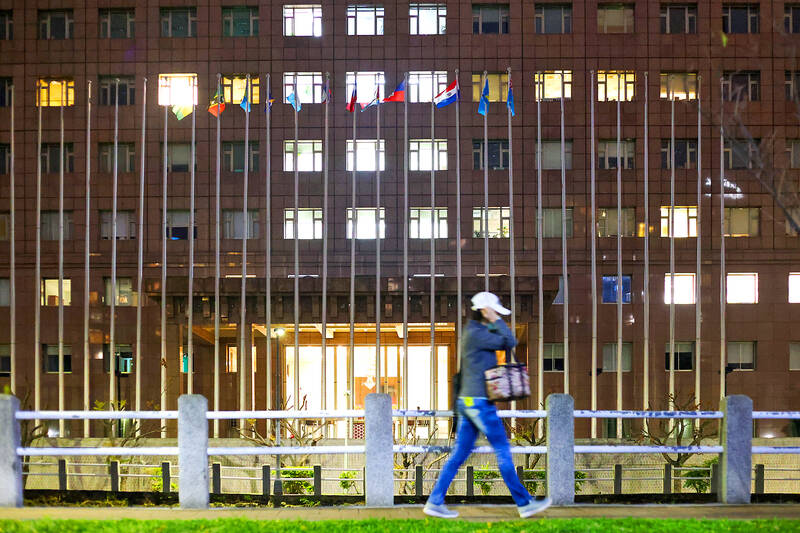Beijing’s retaliatory tactic of wooing former diplomatic ally Nauru away from Taipei after Taiwan elected Vice President William Lai (賴清德) of the Democratic Progressive Party (DPP) would only anger the nation, Taiwanese politicians and analysts said yesterday.
Taiwan on Monday terminated diplomatic ties with Nauru with immediate effect after the Pacific island nation earlier in the day announced that it would recognize the People’s Republic of China.
The Ministry of Foreign Affairs said that Nauru’s government had asked for a large sum of money prior to the switch — a request that Taiwan refused.

Photo: Ritchie B. Tongo, EPA-EFE
The Pacific microstate’s recognition switch, coming two days after the presidential election, shows that Beijing has launched a new campaign to force concessions out of Lai before his inauguration on May 20, Taiwan Brain Trust advisory committee member Wang Chih-sheng (王智盛) said on Monday.
However, the bullying tactic of poaching diplomatic allies would likely anger Taiwanese, as Beijing’s actions are tantamount to a declaration of war on the democratic process, making Taiwan more apathetic toward China, Wang said.
In arranging for Nauru to drop Taiwan, Beijing sought to promote its “one China” principle and register its disapproval of a US delegation visiting, said Anson Hung (洪耀南), an associate professor of international relations at Tamkang University.
The move by China would have limited effect, as Taiwan’s diplomatic strategic focus long ago shifted to cultivating its relationships with the US, Japan and European countries, while Taiwanese care little about retaining diplomatic allies, Hung said.
The formal recognition of other countries serves no purpose other than being symbolic proof that the Republic of China continues to exist, Wang said.
Taiwan can expect Beijing to ratchet up pressure in the diplomatic, military, economic and legal domains, he said.
China’s attempt to punish Taiwanese for electing a political candidate it dislikes would further tarnish its image and stoke dissatisfaction with its conduct in the West, Taiwan New Constitution Foundation deputy director Sung Cheng-en (宋承恩) said.
Targeting the nation’s diplomatic allies is likely in retaliation against Lai’s victory, DPP caucus director Liu Shyh-fang (劉世芳) said.
It is not surprising that Beijing, not being able to tolerate the free decisions of Taiwanese, would resort to childish tantrums and thuggish behavior, DPP Legislator Wang Ting-yu (王定宇) said.
However, there were calls for diplomacy with Beijing from members of the opposition.
Taiwan’s loss of a diplomatic ally immediately after the vote shows that the DPP government’s foreign policy is flawed, Chinese Nationalist Party (KMT) caucus whip Tseng Ming-chung (曾銘宗) said.
Lai should present an olive branch to China upon taking office as president, Tseng added.
Additional reporting by Lin Hsin-han

Taiwan is to commence mass production of the Tien Kung (天弓, “Sky Bow”) III, IV and V missiles by the second quarter of this year if the legislature approves the government’s NT$1.25 trillion (US$39.78 billion) special defense budget, an official said yesterday. Commenting on condition of anonymity, a defense official with knowledge of the matter said that the advanced systems are expected to provide crucial capabilities against ballistic and cruise missiles for the proposed “T-Dome,” an advanced, multi-layered air defense network. The Tien Kung III is an air defense missile with a maximum interception altitude of 35km. The Tien Kung IV and V

The disruption of 941 flights in and out of Taiwan due to China’s large-scale military exercises was no accident, but rather the result of a “quasi-blockade” used to simulate creating the air and sea routes needed for an amphibious landing, a military expert said. The disruptions occurred on Tuesday and lasted about 10 hours as China conducted live-fire drills in the Taiwan Strait. The Civil Aviation Administration (CAA) said the exercises affected 857 international flights and 84 domestic flights, affecting more than 100,000 travelers. Su Tzu-yun (蘇紫雲), a research fellow at the government-sponsored Institute for National Defense and Security Research, said the air

Taiwan lacks effective and cost-efficient armaments to intercept rockets, making the planned “T-Dome” interception system necessary, two experts said on Tuesday. The concerns were raised after China’s military fired two waves of rockets during live-fire drills around Taiwan on Tuesday, part of two-day exercises code-named “Justice Mission 2025.” The first wave involved 17 rockets launched at 9am from Pingtan in China’s Fujian Province, according to Lieutenant General Hsieh Jih-sheng (謝日升) of the Office of the Deputy Chief of the General Staff for Intelligence at the Ministry of National Defense. Those rockets landed 70 nautical miles (129.6km) northeast of Keelung without flying over Taiwan,

A strong continental cold air mass is to bring pollutants to Taiwan from tomorrow, the Ministry of Environment said today, as it issued an “orange” air quality alert for most of the country. All of Taiwan except for Hualien and Taitung counties is to be under an “orange” air quality alert tomorrow, indicating air quality that is unhealthy for sensitive groups. In China, areas from Shandong to Shanghai have been enveloped in haze since Saturday, the ministry said in a news release. Yesterday, hourly concentrations of PM2.5 in these areas ranged from 65 to 160 micrograms per cubic meter (mg/m³), and pollutants were